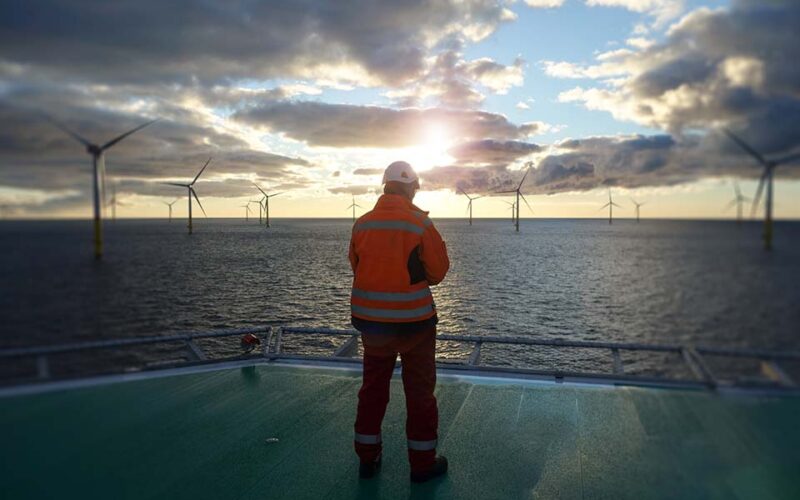Published on: February 5, 2024 at 9:59 AM
The Government has set a target to fully decarbonise energy from the UK power system by 2035. At the same time, demand for electricity is predicted to rise significantly due to the UK’s move to a balanced energy mix. Increased demand for wind is a vital component to achieving our net zero ambitions. To achieve a decarbonised power system, wind power is expected to deliver at more than four times its present performance – but who will deliver wind power?
Energy & Utility Skills is the industry body for skills in the power, gas, water, and waste management industries. A recognised standard-setting body, Energy & Utility Skills convenes industry employers and Government and key industry stakeholders to ensure that industry is represented, and that apprenticeships, qualifications, and industry training programmes deliver the skills that are needed – providing confidence for the utilities industries, the workforce, and customers across the UK.
“Unleashing the power of wind energy isn’t just a pathway to achieving net zero; it’s a dynamic journey of progress. As technology propels the industry forward, your workforce isn’t just adapting; it’s evolving through reskilling. Attracting and retaining the future workforce and mapping routes to competence will ensure that they receive targeted training to maintain a safe, skilled and sustainable workforce.”
Stephen Barrett, Director of Membership and Strategic Engagement, Energy & Utility Skills.
A landmark partnership between RenewableUK and Energy & Utility Skills, to create the training and assessment standards needed to meet the UK’s renewable workforce demand, was launched on 1 December 2023.
The move aims to provide the renewables sector with a means to develop national occupational standards, apprenticeship standards and frameworks, alongside other short course and modular training programmes and assessments for new entrants and to enable the up-skilling and re-skilling of workers already in employment.
The new partnership will support delivery of the strategic priorities for people and skills, outlined by the Offshore Wind Industry Council in its upcoming skills strategy due to be published in Q1 2024.
The alliance between RenewableUK, which represents some 500 organisations across the renewables sector and Energy and Utility Skills, which represents all major asset owners in the gas, power and water industries, will see each organisation gain representation on the others’ skills governance groups and support delivery of the Offshore Wind Sector Deal and other strategic ambitions for skills in the energy and utilities sector.
Energy & Utility Skills is engaged with the Green Jobs Delivery Group – the only high-level, cross-government forum that is shaping the future delivery of the jobs and skills that will deliver net zero. Our research with our members has provided the future skills needs data that is informing the Government’s major Net Zero Workforce Plan, due to be published in early 2024.
Both organisations are working alongside Government and other industry bodies to develop a Green Skills Action Plan that aims to capitalise on net-zero and energy security objectives in a way that maximises job creation and opportunities in the green economy.
Engineering bodies frequently report historic and ongoing skills shortages and recruitment challenges across a range of disciplines. The rapid growth of the wind power industry presents a unique opportunity to collaborate to ensure future skills requirements are met and growth and ambitions are not impeded, and that there is a workforce with the safety-critical technical skills to underpin the journey to net zero.
However, with the ambitious 2030 offshore wind targets, we have to pick up the pace. To meet the British Energy Security Strategy 50GW target, which assumes that every project in the current pipeline is successful, we need to attract and retain around 10,000 people every year. Simply put – the challenge is growing whilst our time to achieve it is reducing.
Energy & Utility Skills is already working with sector employers and stakeholders on a wind turbine apprenticeship standard, and on the industry training programmes that will be needed for the growing high voltage direct current transmission system.


The power generation industry is engaged in significant technological advancements within renewable sources of power. For example, in October 2023 the world’s largest offshore wind farm, Dogger Bank, produced power for the first time. When fully operational, it will provide power equivalent to the needs of six million homes.
These advancements are creating numerous job opportunities, with further anticipated industry growth indicating a requirement for an additional 104,000 skilled professionals within the offshore wind sector alone by 2030.
There are particular needs around electrical and mechanical engineering, project management, health and safety, planning and consenting, high voltage cabling, welding and fabrication, and SCADA jobs (supervisory control and data acquisition for control systems).
To advance the UK’s journey toward achieving net zero, Energy & Utility Skills has established the Power Generation Group within the National Skills Academy for Power (NSAP). This initiative strategically aligns with the needs of the renewable power generation industries and underscores Energy & Utility Skills’ commitment to supporting the delivery of a skilled and sustainable workforce.
We know that by collaborating with industry and key stakeholders we can drive forward initiatives that create synergy and deliver a safe, skilled and sustainable workforce that ensures net zero is achievable.
To find out more and to get involved, please contact stephen.barrett@euskills.co.uk
